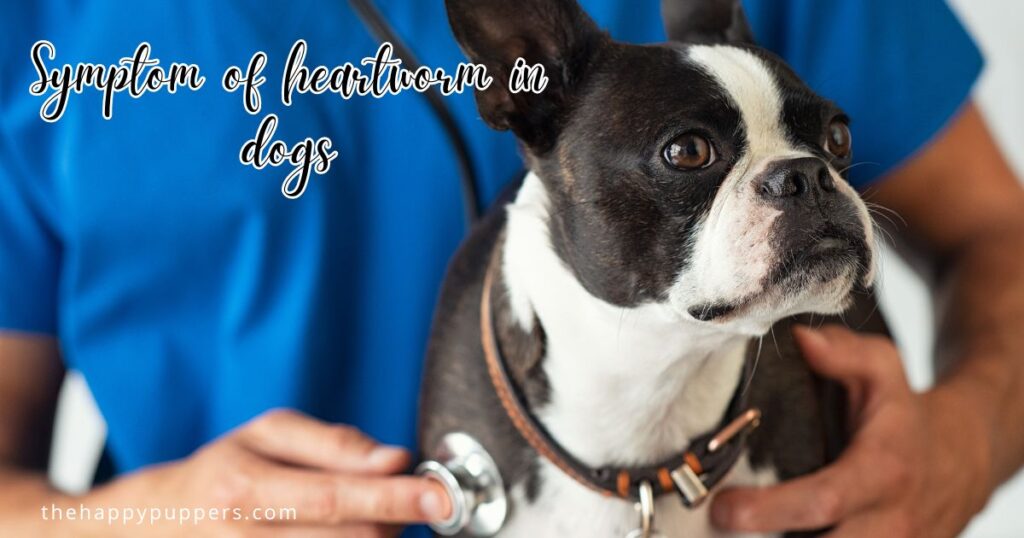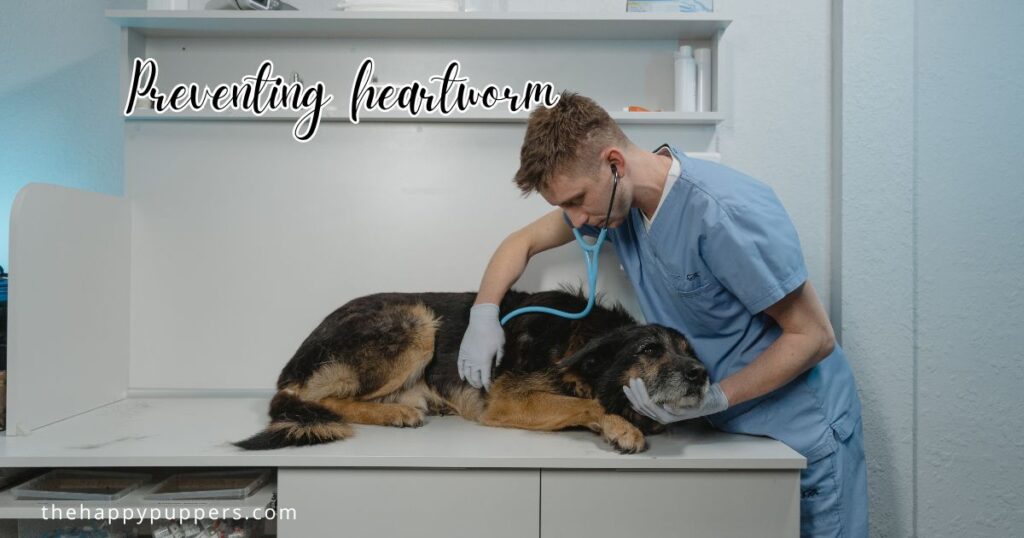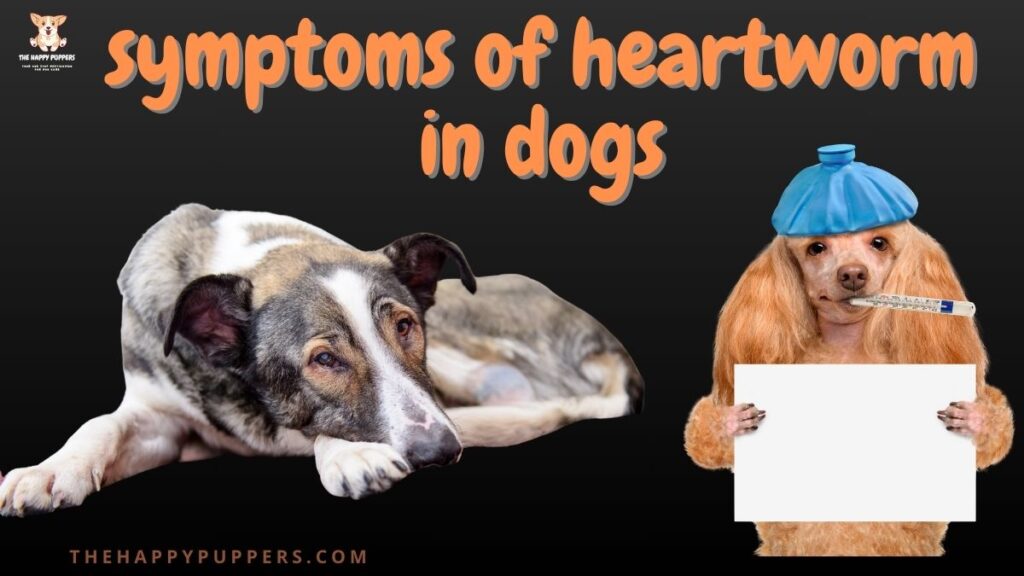Dogs of all sizes and breeds are susceptible to heartworm disease, which is a silent but possibly fatal menace. These parasitic invaders may be hidden within a dog’s body and unseen, yet they can have a significant negative effect on your beloved pooch’s health. To protect our beloved friends, it is crucial for us as responsible dog owners to be aware of symptom of heartworm in dogs and the available treatments for the same.
In this article, I will discuss heartworms, their effects on our dog pals, and the precautions you can take to keep your dog safe from this sneaky danger. Be it an experienced dog owner or someone who is thinking about getting a dog, understanding the symptom of heartworm in dogs is essential to giving your four-legged family members the greatest care and protection possible. Together, we will explore the topic of heartworms and how to protect your dog’s health.
If you wish to be the best dog guardian and stay updated with the latest tips from me dog care world, subscribe to The Happy Puppers. The subscription option is present in the sidebar. If you like watching videos, please subscribe to the YouTube channel of The Happy Puppers, Shruti and Delta. Remember to ring the notification bell and set it to ALL so you never miss an update.
Topics covered in this blog post
Symptom of heartworm in dogs: What is heartworm?
Dirofilariasis, another name for heartworm sickness, is a dangerous and sometimes fatal illness that affects dogs. Dirofilaria immitis is the parasitic worm that causes it. Heartworms can grow and multiply inside a dog’s heart, lungs, and blood vessels. They are spread via mosquito bites. Thus, it is crucial that as a responsible dog guardian, you must understand the symptom of heartworm in dogs.

Here’s a closer look at heartworm illness:
Transmission
The primary means of transmission for heartworm disease is mosquito bites. Immature heartworms, called microfilariae, are transmitted to mosquitoes by biting an infected dog’s bloodstream. Within the mosquito, these microfilariae mature into infectious larvae.
Lifespan
These infectious larvae enter the circulation of a healthy dog by the bite of an infected mosquito. After migrating to the pulmonary and cardiac arteries, the larvae develop into adult worms. Heartworms can live for several years and reach a maximum length of 12 inches.
Can be fatal
Heartworms can impede blood flow to the heart and lungs as their population grows, which can result in a range of health problems. If left untreated, heartworm illness can cause organ damage, lung disease, heart failure, and even death.
Intensity
Heartworm disease can range in severity. While some dogs may have a large infestation with serious health repercussions, others may just have a few worms and show moderate symptoms.
Distribution by Region
Around the world, heartworm disease is common, and the risk varies depending on the location. In regions where mosquito populations are larger, it is more prevalent.
Animals Other Than Cats
Heartworms primarily affect dogs, but they can also infect cats and certain other animals. Cats with heartworm illness typically present differently and might be particularly harder to diagnose and cure.
For dog guardians, knowing the symptom of heartworm illness is essential since protecting your dog’s health and well-being depends on early detection and prevention. Now, it’s time to focus on the symptom of heartworm in dogs.
Symptom of heartworm in dogs
In its early stages, dogs with heartworm disease may not exhibit any signs, making it a silent threat. But as the illness worsens, the warning signs and symptoms become more noticeable. For appropriate management and early discovery, it is imperative to recognize these indications. The following are typical warning signs and symptoms of canine heartworm disease:

Symptom of heartworm in dogs: Chronic coughing
Chronic coughing can be an early indicator of heartworm illness, particularly during or after physical activity. It frequently happens as a result of heartworms irritating and inflaming the lungs.
Idleness
Heartworm disease in dogs can make them look sluggish, lethargic, and less energetic than normal. Common symptoms include lethargy, and affected dogs may be less tolerant of exercise. If you notice your dog sulking on the bed, not being his regular playful self, and not interacting with you the way he usually does, it could be a symptom of heartworm disease in dogs.
Symptom of heartworm in dogs:Trouble Breathing:
As a result of heartworms proliferating and blocking the pulmonary arteries, dogs may have trouble breathing. Even when they are at rest, they may breathe quickly or laboriously. If you notice that your dog is in any kind of discomfort, take him to the vet as soon as possible.
Decreased Hunger and Loss of Weight
Dogs with heartworm disease may lose weight as a result of appetite loss. This may happen gradually, and affected dogs could get noticeably leaner. Loss of appetite and subsequently weight may occur in cases of other diseases as well. Thus, do not ignore this symptom.
Increase in the size of the Abdomen
Dogs with advanced cases of ascites, or an accumulation of fluid in the abdominal cavity, may acquire an enlarged abdomen. The cause of this is heart failure.
Coughing blood
Dogs that have heartworms may cough up blood in severe cases, which is an indication of serious lung and cardiac damage. Needless to say, this symptom can also occur due to other illnesses. However, you should never ignore this symptom by any means.

Shock/collapse
Dogs with a high level of heartworm in their system may, in the worst cases, collapse, go into shock, or even pass away.
It’s crucial to remember that every dog is different when it comes to the severity and combination of symptoms. While some dogs may only have minor symptoms, some may display more serious ones. Furthermore, dogs with a low heartworm number in them may go for a long time without showing any signs.
Heartworm illness can be difficult to treat in advanced stages, thus early diagnosis is essential for successful therapy. Even if your dog seems healthy, routine heartworm testing and veterinary examinations are crucial for early identification and treatment.
Symptom of heartworm in dogs: Diagnosis and Testing
Effective treatment and a better prognosis for dogs with heartworm illness depend on early detection. To confirm the existence of heartworms, veterinarians utilize a combination of diagnostic testing and clinical examination. The following are the main techniques for testing and diagnosis:
Blood testing
Testing for antigens
The antigen test is the most popular and trustworthy method of diagnosing heartworm illness. It determines whether adult female heartworms are present in the blood. Adult female heartworms release proteins called antigens, and this test is quite specific for them.
Microfilaria test
Another type of blood test called a microfilaria test detects whether the blood contains microfilariae or immature heartworms. This test is frequently done in conjunction with the antigen test to assist in identifying the severity of the infection.
Imaging studies
Radiographs, or X-rays, are used to evaluate the state of the lungs and heart. They can show pulmonary and cardiac artery enlargement, which is frequently the outcome of heartworm infection.
Ultrasonography
An ultrasound can be used to get a closer look at the heart and main blood veins. Your vet will conduct an ultrasound on your dog if they feel it may show a better picture of what your dog might be going through.
Assessment by the vet of symptom of heartworm in dogs
A vet will evaluate the clinical symptoms of the dog, such as coughing, dyspnea, and activity intolerance, as well as its medical history. Physical examination results, such as the existence of irregular heart and lung sounds, may offer more hints.

Confirmatory Testing
A second round of tests may be conducted several months later to confirm the diagnosis if the first round’s results are unclear or the dog is exhibiting symptoms of infection.
It’s crucial to remember that heartworm illness can be difficult to properly diagnose, particularly in the early stages. Regular heartworm testing is therefore advised, even for dogs receiving prophylactic medicine. Early detection can stop the onset of serious symptoms and problems and enable prompt action.
Your dog’s veterinarian will go over the best course of action if symptom of heartworm in dogs are there and your dog tests positive for this microbe. This may involve both supportive care and medicine to eradicate the heartworms. Treatment plans can be complicated, and managing any possible side effects and keeping an eye on them is frequently necessary.
Symptom of heartworm in dogs: why not prevent heartworm?
Treating an active infection is significantly more difficult, dangerous, and expensive than preventing the occurrence of symptom of heartworm in dogs. Thankfully, there are several extremely successful ways to keep dogs from getting heartworm disease. The following are crucial methods for ensuring the safety of your dog:

Medication to Prevent Heartworms
There are several ways to take monthly heartworm preventive drugs, including oral tablets, chewables, topical solutions, and injections. If these drugs are used as prescribed by a veterinarian, they are quite successful at preventing heartworm infection.
The way these preventives function is by getting rid of any microfilariae in the blood and stopping heartworm larvae from growing into adult worms. Intestinal worms and other internal parasites may also be protected against them.
Check with Your Veterinary Professional
To choose the best preventive medicine for your dog, you must speak with your veterinarian. your vet will introduce you to the best medications on the market. nee medications that are available in the market are not equally effective in the treatment of symptom of heartworm in dogs.
Symptom of heartworm in dogs: Dosage
You can also get advice from your veterinarian regarding the proper dosage and timetable for administration. The dosage will depend on the age and weight of the dog. Please do not change the dose or stop giving meds to your dog if he seems to be doing better. Medicines should only be stopped at the recommendation of the vet.
Year-Round Prevention
Prevention of heartworm disease should be a year-round endeavor, even in regions with milder temperatures. In different seasons and locations, mosquitoes might be active. Your dog may become susceptible to infection if you miss doses or don’t provide seasonal preventive care.
Consistent Testing
Frequent testing is essential, even if your dog is on a heartworm prevention program. A yearly heartworm test guarantees that your pet won’t contract the infection. Furthermore, testing is necessary if you have skipped doses of the prophylactic drug. Testing can help identify if your dog is in the early stages so that the treatment plans can be implemented as soon as possible.

Control of Mosquitoes:
Reducing mosquito exposure can support initiatives to avoid heartworms. Reduce the amount of standing water around your house to lessen mosquito breeding grounds, and protect your dog from mosquitoes by using screens or repellents.
Yearly Veterinary Examinations
Frequent veterinary examinations can guarantee that your dog is healthy and that heartworm prophylaxis is protecting your pet against heartworms. Your veterinarian can evaluate your dog’s general health and offer advice on preventive care during these appointments.
Treatment of symptom of heartworm in dogs
Check-in with your veterinarian as soon as possible if you’ve neglected to take your heartworm prevention medication on time. To make sure your dog stays heartworm-free, more tests and prophylactic treatments might be required, depending on how long the lapse lasted.
Not only is heartworm disease prevention essential for the health and longevity of your dog, but it’s also a responsible aspect of pet care. You may drastically lower your dog’s risk of contracting heartworm disease by using preventive medicine consistently, getting tested frequently, and providing year-round protection. Please do not hesitate to seek advice from your veterinarian regarding heartworm prevention that is unique to your dog’s needs if you have any worries or queries.
Heartworm Disease Treatment
In dogs, treating heartworm illness can be a difficult and dangerous procedure, particularly when the condition is advanced. Usually, a regimen of drugs, rigorous rest, and thorough veterinary supervision are used. An outline of the course of therapy for dogs with heartworm infection is provided below:
Validating the Diagnosis:
Before starting treatment, your veterinarian will first confirm the suspected diagnosis by the use of diagnostic imaging, like radiography ultrasounds, and blood tests to confirm the presence of heartworms.
Basic Care and Stabilization
Dogs may need to be stabilized initially in severe cases. Hospitalization, oxygen therapy, and the giving of drugs to treat symptoms like coughing or breathing problems are a few examples of this.
Treatment with Immiticide:
The main drug used to treat the symptoms of heartworms in dogs is known as imiticide or melarsomine dihydrochloride. The medication is injected into the muscles to destroy adult heartworms. The component of arsenic present in the drug is what acts against the heartworms.
The course of treatment usually entails several injections, the quantity of which is determined by the infection’s severity. Usually, this treatment is given in two or three phases, with a few weeks off in between.

Deep Rest
Strict crate rest is required for several weeks in dogs receiving heartworm therapy to avoid problems and lower the possibility of blood clots forming from dying worms and obstructing blood vessels. Minimize enthusiasm and physical activity while recovering.
Other Prescription
To control pain, inflammation, and other symptoms both before and after treatment, your veterinarian may recommend additional drugs. Antibiotics and anti-inflammatories might also be a part of your regimen to help your dog recover fast.
Strict observation
Before, during, and after therapy, routine veterinarian examinations and diagnostics are essential. Blood tests track the existence of microfilariae and evaluate the effectiveness of treatment so that you and your vet know that the treatment is moving in the right direction.
Regular prevention
To guard against recurrent infections, it’s critical to begin your dog on a monthly heartworm preventive program as soon as treatment is finished. This will ensure that the immunity of your dog is ready to fight the infection any and every time
It is noteworthy that heartworm treatment might provide mental and physical difficulties for both the guardian and the dog. The course of treatment carries some risks and problems, including the possibility of blood clots. It may also take several months to finish.

The greatest strategy for treating heartworm disease is always prevention. To protect your dog’s health, regular heartworm testing, year-round prevention, and vigilant mosquito control are necessary. To guarantee the best possible outcome, it is imperative that you diligently adhere to your veterinarian’s recommendations if your dog tests positive for heartworms.
Symptom of heartworm in dogs: locations
Globally, there are differences in the prevalence and severity of heartworm illness. Climate, environment, and geographic location all affect its dissemination and impact. Dog guardians must be aware of the regional variations in heartworm illness to make educated decisions regarding treatment and prevention. An outline of heartworm disease in several regions is provided below:
Regions of High Risk
Heartworm illness is very common in some countries, particularly those with warm, humid climates. Because the mosquito season is typically longer in these areas, the rate of transmission is higher. Tropical regions, portions of Europe, and the southern United States are a few examples.
Regions of Moderate Risk
Although the prevalence is lower, transmission of heartworm disease may happen in areas with a moderate risk. Seasonal fluctuations in mosquito activity may occur in some places, hence reducing the danger. Guardians of dogs in these areas should continue to follow a year-round preventative strategy.
Regions of Low Risk
The prevalence of heartworm disease is extremely low in low-risk areas. These regions frequently experience shorter mosquito seasons, colder temperatures, or mosquito control strategies that work well. Although the risk is reduced, it is still present, thus heartworm prevention is still advised.
Symptom of heartworm in dogs: Modern Trends
Changes in the climate and other environmental factors have the potential to affect the spread of heartworm disease. It’s critical to be aware since conditions that were previously low risk may cause an upsurge in heartworm incidence in some areas.
Regarding Travel
If you take your dog on a trip, especially from a low-risk to a high-risk location, it’s important to modify your preventive plan. For advice on keeping your dog safe when traveling, speak with your veterinarian.
Be aware of the laws
There can be particular laws governing the testing and prevention of heartworms in some areas. Keep yourself informed about any local regulations and adhere to them.

In-depth Knowledge
Heartworm disease management is frequently a specialty of veterinarians in high-risk areas. Consult with vets in your area who are familiar with the particular difficulties that your area faces.
The danger of infection is higher and the need for preventative measures is more pressing in areas where heartworm disease is highly prevalent. Even in low-risk and moderate-risk areas, heartworm illness can still be a concern for dog owners. The most important lesson is that dogs should be heartworm-free throughout the year and that local conditions should influence how you protect your pooch’s health. Being ahead of the disease requires routine veterinary examinations and heartworm tests.
Preventing Symptom of Heartworm in Dogs
Preventive care and responsible pet care are the two main components of heartworm disease prevention for dogs. Here’s a thorough how-to for protecting your pet against this possibly fatal illness:
- Speaking with your veterinarian should be the first step in preventing heartworms. They can offer professional advice on the best preventive medicine and dosage for your dog.
- As prescribed by your veterinarian, give heartworm prevention medicine. Heartworm development can be effectively halted with monthly heartworm-preventative treatments.
- Make sure to use the medication consistently throughout the year, especially in areas where there is a danger of mosquito infestation.
- Arrange for yearly heartworm testing, even if your dog is on preventive treatment.
Control of Mosquitoes
Reduce your dog’s exposure to mosquitoes, as they are the main source of heartworm infection. By getting rid of standing water, applying insect repellents, and installing mosquito screens on doors and windows, you can lower the number of mosquitoes around your house.

Be Wary During the Highest Mosquito Season
During the warm, muggy months, when mosquito activity is at its highest, use extra caution. Mosquitoes are most active during dawn and dusk. Therefore, during these times, keep your dog indoors.
- Make sure your dog has routine veterinary examinations. Early detection and treatment of health conditions, including heartworm illness, can be facilitated by these visits.
- Use a leash to keep your dog under control and stop them from investigating areas where mosquitoes are common when you walk them in high-risk areas.
- Consult your veterinarian to make sure the proper preventative measures are in place before taking your dog on a trip to an area where heartworm infection is more common.
- Administer preventative drugs according to schedule and dose recommendations. If you forget to give your dog medication or put it off, your dog can become vulnerable.
Boost your knowledge regarding symptom of heartworm in dogs
Dogs cannot vocalize their feelings or discomfort. Therefore, as a dog guardian, you must stay updated about any and everything that can harm your pup.
- Keep yourself updated about any local laws and the risk of heartworm disease in your area. Knowledge of local veterinarians can be beneficial.
- See your veterinarian for advice on how to resume the heartworm prevention regimen and guarantee your dog’s safety if you’ve missed a dosage
- Regardless of the danger level in your area, heartworm prevention requires a year-round commitment. Maintaining consistency is essential to keeping your dog healthy.
These guidelines, together with close collaboration with your veterinarian, can help you design a heartworm prevention program that keeps your dog safe and healthy. Don’t forget that the strongest protection against heartworm illness is early prevention, so put these preventative measures into action right away.
Conclusion
Preventing heartworm infection in your dog is a crucial part of being a responsible pet owner. Heartworm disease is a potentially fatal illness that is preventable with comparatively easy steps. You are a key player in maintaining the health and welfare of your four-legged friend as a dog owner.
We have covered every aspect of heartworm illness in this guide, including its causes, symptoms, diagnosis, treatment options, and geographical variations. We’ve also talked about the value of preventative and practical dog protection.
Your duty as a responsible dog guardian is to keep your dog free from heartworms. It guarantees that your pet will live a long, healthy, and contented life at your side. You are significantly improving your dog’s health and well-being by adhering to the rules and recommendations in this article. Remain vigilant, knowledgeable, and dedicated to your dog’s safety.

If you found this post insightful, then please subscribe to The Happy Puppers. The subscription option is present in the sidebar. If you like watching videos, subscribe to the YouTube channel of The Happy Puppers, Shruti and Delta. remember to ring the notification bell so that youtube can notify you whenever the next video goes live. I you have any queries about this article or any other on The Happy Puppers, please put it in the comment section. I will be happy to answer them.
See you in my next blog post
Dr. Shruti
Frequently Asked Questions
A parasitic worm that is spread by mosquito bites is the source of heartworm disease. Heartworm larvae can enter a dog’s bloodstream through an infected mosquito bite.
Lethargy and coughing are two possible early symptoms. Dogs who have the condition may have breathing problems, weight loss, and an enlarged tummy, among other symptoms.
Blood tests are used in the diagnosis process to look for microfilariae and heartworm antigens. X-rays and ultrasounds are used to evaluate the heart and lungs.
Indeed, there are hazards associated with therapy for heartworm illness, and it is a difficult condition. Typically, cage rest, strict veterinary supervision, and treatment to eradicate adult heartworms are included.
Prevent heartworm disease in your dog by giving it frequent heartworm preventative medicine as prescribed by your veterinarian. It’s also critical to minimize mosquito contact and conduct consistent testing.

